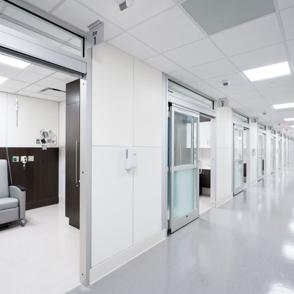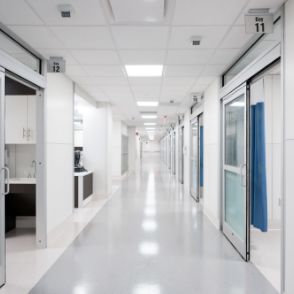Smart technology in healthcare is becoming an essential part of modern healthcare environments. It refers to the use of advanced digital tools and systems that enhance how healthcare facilities operate and deliver care.
These technologies range from smart wayfinding systems that help patients navigate large hospitals to artificial intelligence (AI) tools that assist healthcare providers in diagnosis and treatment planning. These technologies are designed to improve patient experience, streamline operations and foster more efficient healthcare delivery.
As we look ahead to the future of healthcare spaces, here at Architectural Wallsz we understand how these technologies shape the industry. That’s why our modular systems are designed to integrate the latest digital technologies and adapt to evolving needs in patient care.
The Role of Smart Technology in Patient Experience
One of the most significant ways that smart technology in healthcare is changing the industry is by improving the patient experience.
Hospitals and healthcare facilities are often large and complex, making it easy for patients and visitors to feel lost or disoriented. Digital wayfinding systems are transforming this experience by providing easy-to-use, real-time navigation tools.
These systems can be found as interactive screens, mobile apps and digital signage. All of which can be seamlessly integrated into prefabricated wall systems, behind touchscreen glass. They guide patients through hospital corridors and direct them to their appointments and waiting times in certain areas.
For healthcare providers, these systems help improve patient satisfaction by reducing frustration, saving time and making healthcare environments feel more accessible.
Smart Technology in Healthcare Operations
Beyond patient experience, smart technologies are fundamentally reshaping healthcare environments.
Data-Driven Efficiency with Real-Time Tracking
Real-time tracking is one of the key benefits of integrating smart technology in healthcare spaces. Our modular systems are designed to accommodate the most recent AI tools, such as predictive analytics, machine learning and automated patient tracking, enable precise resource management and improve operational efficiencies. Tracking systems can ensure that high-demand medical equipment is available when needed or that healthcare staff are in the right place at the right time.
This integration leads to a more efficient use of resources, reduces waste and improves the overall functioning of a healthcare facility. By reducing unnecessary delays, healthcare providers can deliver better, more timely care, which is critical in environments where every second counts.
AI for Operational Optimisation
Beyond logistics, AI is beginning to play a role in optimising operational workflows. AI-driven systems are used to predict patient admissions, manage bed occupancy and streamline the scheduling of procedures.
These technologies are not replacing healthcare professionals but providing them with powerful diagnostic support and ultimately improving patient outcomes and treatment strategies.
Future-Proofing with Prefabricated Interiors
As technology in healthcare continues to evolve, the challenge for healthcare facilities will be to ensure their infrastructure remains relevant, adaptable and resilient in the face of unforeseen advancements. Prefabricated interiors offer a compelling solution to this challenge by providing a foundation that can grow and adapt with innovation.
Our Modular wall systems are inherently flexible. They allow for the seamless integration of emerging technologies, from next-generation sensors to AI-powered diagnostic tools. For example, prefabricated interiors can accommodate new wiring, data systems or devices with minimal disruption to existing operations, reducing downtime and costs.
Furthermore, as IoT devices and smart systems become more prevalent, the ability to retrofit healthcare spaces with these innovations without major renovations is critical. Prefabricated interiors, designed with modularity and scalability in mind, make it easier to upgrade hospitals’ infrastructure to stay ahead of the technological curve.
This adaptability also supports sustainability by extending the life of healthcare facilities. Instead of demolishing and rebuilding outdated spaces, prefabricated solutions enable continuous modernisation. Hospitals equipped with modular systems today are better positioned to integrate tomorrow’s cutting-edge advancements, ensuring they can respond effectively to the evolving needs of patients and healthcare providers alike.
By bridging the gap between current needs and future possibilities, prefabricated interiors not only enhance operational efficiency but also safeguard healthcare environments from obsolescence. In doing so, they play a pivotal role in shaping the hospitals of the future-spaces that are smarter, more versatile and ready to meet the demands of a rapidly changing world.
Looking Ahead at the Future of Smart Technology in Healthcare
The role of smart technology in healthcare is set to grow exponentially. Innovations in AI, IoT (Internet of Things) and other digital tools will continue to improve accuracy, speed and efficiency.
Healthcare spaces will be smarter, more responsive and more capable of meeting the demands of an increasingly complex healthcare environment. With our modular systems, designed for seamless integration and adaptability, healthcare facilities will be ready for any innovations the future may bring.






Sorry, the comment form is closed at this time.